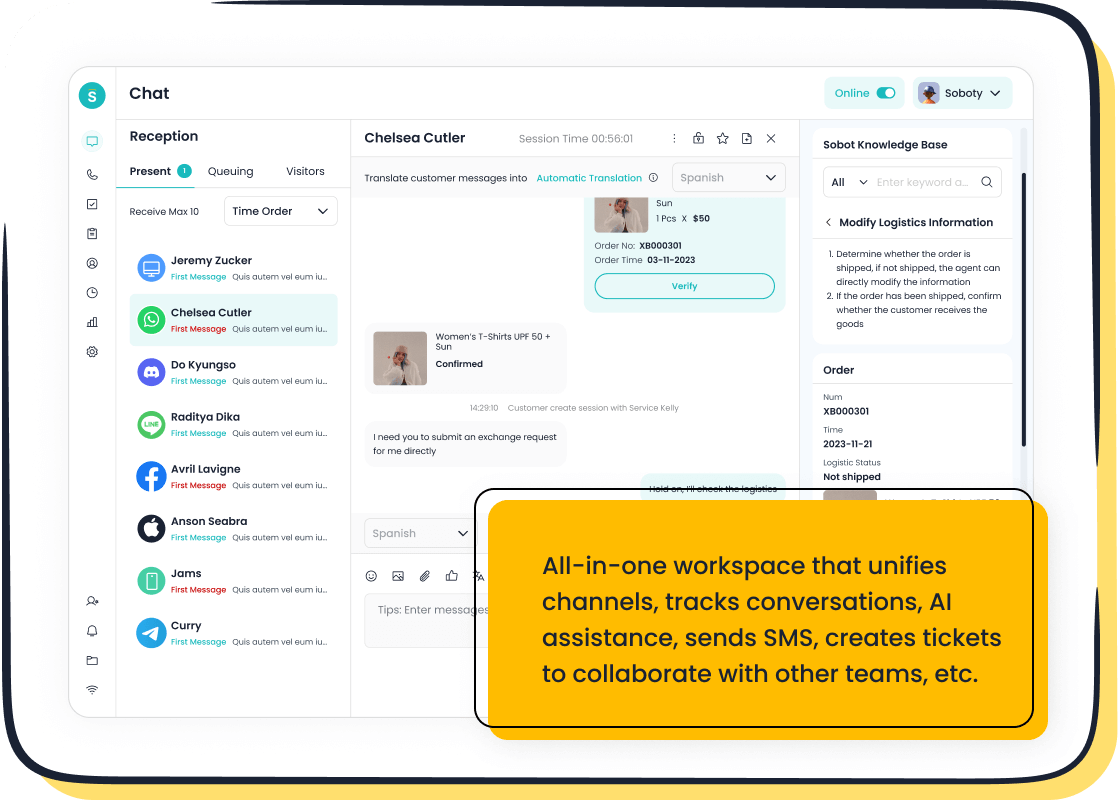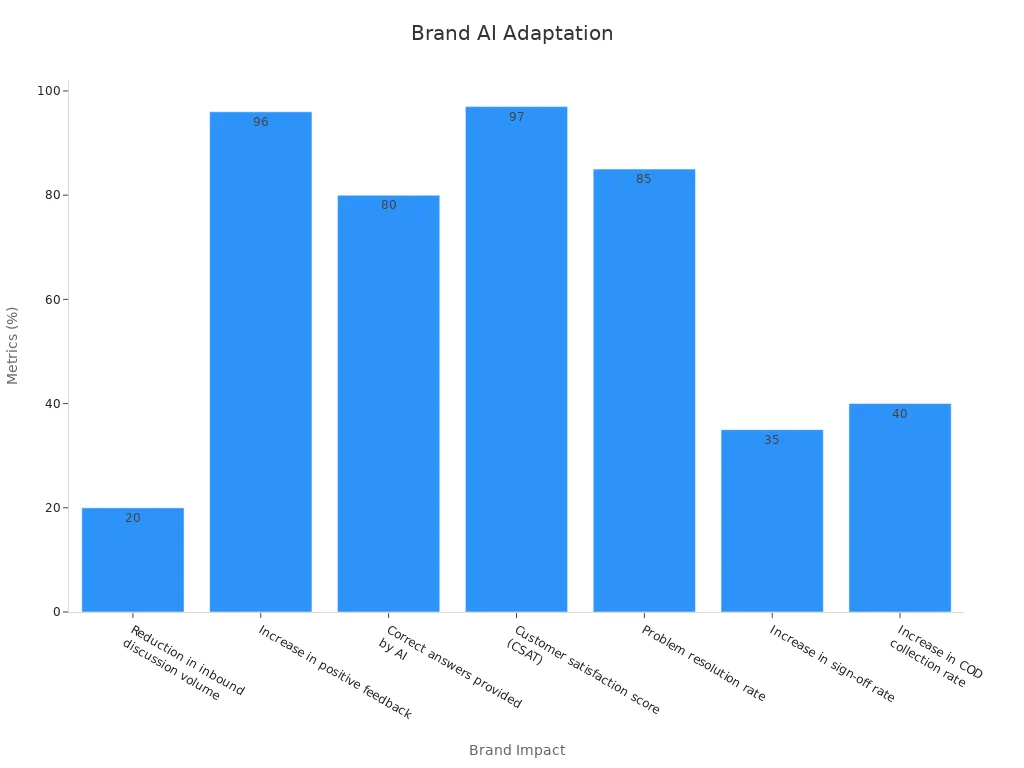Rufus and the Transformation of Online Shopping Behavior in 2025

Imagine a world where every online shopping experience feels uniquely tailored to your preferences. Sobot, alongside innovations like Amazon's AI shopping assistant, Rufus, is turning that vision into reality. This cutting-edge technology not only streamlines your shopping journey but also redefines how products are recommended to you. Personalized experiences are now a necessity, with 76% of consumers expressing frustration when companies fail to meet these expectations. AI-powered solutions, such as Sobot and Rufus, are driving this transformation, boosting retail profits by 15% and cutting marketing costs by 20%. By 2025, Amazon projects that Rufus, its AI shopping assistant, will influence over $711.7 billion in product coverage globally, revolutionizing the way we shop.
What is Amazon Rufus AI?
Defining Rufus and Its Role in E-Commerce
Amazon Rufus AI is a groundbreaking tool designed to redefine how you shop online. Acting as a conversational shopping assistant, Rufus uses advanced artificial intelligence to understand your preferences and deliver personalized recommendations. It analyzes your past purchases, browsing patterns, and search queries to anticipate your needs. By leveraging natural language processing, Rufus grasps the context behind your searches, ensuring accurate and relevant results.
Rufus doesn’t just help you find products—it transforms the way you interact with e-commerce platforms. It simplifies decision-making by comparing products side-by-side, highlighting their pros and cons, and offering tailored suggestions. This AI-powered shopping assistant empowers you to make informed choices, saving time and enhancing satisfaction.
How Rufus Fits into the Amazon Shopping Experience
Rufus seamlessly integrates into the Amazon shopping experience, making it more intuitive and efficient. Instead of relying on traditional keyword searches, you can ask Rufus specific questions about products, such as “Which laptop is best for gaming under $1,000?” It provides real-time guidance, pulling data from product listings, reviews, and Q&A sections to deliver comprehensive answers.
- Key Integration Features:
- Conversational Interface: You interact with Rufus naturally, as if chatting with a knowledgeable friend.
- Streaming Architecture: Rufus delivers initial responses quickly while generating detailed answers in the background.
- Voice Search Capability: Integrated with Alexa, Rufus allows hands-free product searches for added convenience.
Amazon has optimized Rufus using its Trainium and Inferentia chips, ensuring faster response times and efficient handling of queries. This advanced technology enhances your shopping journey, making it smoother and more engaging.
Key Features of Amazon's AI Shopping Assistant
Rufus boasts a range of features that set it apart as a transformative tool in e-commerce. These functionalities are designed to improve your shopping experience and help brands adapt to changing consumer behaviors.
| Feature | Description |
|---|---|
| Conversational Shopping | Rufus acts as a conversational assistant, making product discovery effortless. |
| Personalized Recommendations | Offers tailored suggestions based on your preferences and past interactions. |
| Real-time Guidance | Provides instant answers and product comparisons to streamline decision-making. |
| Advanced Filtering | Lets you refine search results by brand, price, ratings, and other attributes. |
| Visual Search | Allows you to upload images to find visually similar products available on Amazon. |
- Additional Capabilities:
- Dynamic Content: Rufus adjusts search results based on your previous interactions.
- Predictive Analytics: It anticipates your needs and suggests products proactively.
- Customized Promotions: You receive personalized discounts to enhance purchase likelihood.
Rufus doesn’t just enhance your shopping experience—it also helps brands optimize their product listings. By encouraging sellers to use natural language and prioritize key phrases, Rufus ensures that products align with customer queries. This creates a win-win scenario for both shoppers and sellers.
Enhancing the Amazon Shopping Experience with Rufus

Personalization and Tailored Recommendations
Rufus transforms your shopping experience by offering meaningful personalization. It doesn’t just suggest products—it understands your preferences and anticipates your needs. By analyzing your past purchases, browsing habits, and search queries, Rufus delivers tailored recommendations that feel uniquely crafted for you.
Imagine searching for a new pair of running shoes. Instead of scrolling through endless options, Rufus identifies the best choices based on your style, budget, and previous purchases. This personalized assistance saves time and ensures you find exactly what you need.
Rufus uses advanced AI and natural language processing (NLP) to interpret your intent. It goes beyond simple keyword matching to understand the context behind your searches. For example, if you search for “eco-friendly water bottles,” Rufus prioritizes products that align with your values.
| Feature | Description |
|---|---|
| Advanced AI and NLP | Utilizes AI and natural language processing to interpret shopper intent beyond simple keyword matching. |
| Semantic Relevance | Focuses on understanding the context and meaning behind queries rather than just keyword density. |
| Continuous Feedback Loop | Adjusts recommendations based on real-world shopper interactions, improving accuracy over time. |
| Intent-Focused Matching | Moves away from keyword stuffing to understanding the 'why' behind searches for better product matches. |
| Conversational Recommendations | Engages users through dialogue to clarify needs, enhancing the personalization of recommendations. |
| Comprehensive Listing Analysis | Prioritizes detailed and structured listings that address user questions and scenarios effectively. |
This approach ensures that every product suggestion feels relevant and helpful, making your shopping journey smoother and more enjoyable.
Streamlining Product Discovery and Decision-Making
Rufus simplifies product discovery by offering a conversational shopping experience. Instead of typing keywords, you can ask Rufus questions like, “What’s the best smartphone for photography under $800?” It responds with detailed product suggestions, reviews, and comparisons, helping you make informed decisions.
The Amazon Rufus patent highlights its ability to redefine product discovery. It focuses on contextual and personalized product discovery, ensuring that every interaction feels intuitive. Rufus introduces options you may not have considered, broadening your horizons and encouraging exploration.
- Key Benefits of Rufus in Product Discovery:
- Instant Product Details: Ask about features and reviews to gain confidence in your purchases.
- Inspiration for New Experiences: Discover products that align with hobbies or interests you’re exploring.
- Streamlined Customer Support: Track orders and connect with support effortlessly.
Rufus also uses AI-driven discovery to refine its recommendations in real time. It connects your intent to products using context, maps features to benefits, and ranks suggestions based on relevance.
- Semantic Understanding: Links shopper intent to products using context.
- Inference Optimization: Matches product features to benefits for better relevance.
- Real-Time Learning: Continuously improves recommendations based on user interactions.
- Recommendation Ranking: Prioritizes the most relevant products using shopper data.
- Dynamic Adaptability: Adjusts suggestions based on your unique shopping path.
This AI-powered discovery ensures that you spend less time searching and more time enjoying your purchases.
Increasing Consumer Engagement and Satisfaction
Rufus doesn’t just help you shop—it keeps you engaged throughout the process. Its conversational interface makes shopping feel interactive and enjoyable. You can ask questions, refine searches, and explore new categories without feeling overwhelmed.
Personalized assistance plays a key role in boosting satisfaction. Rufus learns from consumer behavior, adapting its suggestions to match your preferences. For example, if you frequently buy organic snacks, Rufus highlights similar products and introduces new brands you might love.
The rise of AI-powered shopping assistants like Rufus has transformed how you interact with e-commerce platforms. By offering tailored recommendations and simplifying product discovery, Rufus ensures that every shopping experience feels rewarding.
Amazon has designed Rufus to enhance engagement by offering dynamic content and predictive analytics. It anticipates your needs, suggests products proactively, and even provides customized promotions. This approach not only improves your satisfaction but also helps brands connect with you more effectively.
With Rufus, shopping becomes more than a transaction—it becomes an experience. You feel valued, understood, and empowered to make choices that align with your lifestyle.
The Impact of AI-Powered Shopping Assistants on Brands
Shifting Advertising Strategies on Amazon
AI-powered tools like Amazon Rufus AI are reshaping how brands approach advertising. Traditional keyword-based strategies are becoming less effective as Rufus interprets the intent and context behind your searches. This shift encourages sellers to focus on meaningful personalization rather than generic targeting.
For example, Rufus analyzes your historical purchases and browsing behavior to recommend products that align with your preferences. Sellers who adapt to this model gain a competitive edge by creating listings that resonate with your needs. Early experiments with Rufus show significant variations in recommendations based on user behavior, highlighting the importance of tailored advertising.
- Key Changes in Advertising:
- Intent-driven discovery replaces keyword matching.
- Personalized promotions increase conversion rates.
- AI insights help brands optimize product listings.
These changes not only improve your shopping experience but also drive higher engagement and sales for brands.
Navigating Competition in the AI-Driven Marketplace
The integration of AI technologies like Amazon Rufus AI has intensified competition among brands. To stay ahead, businesses must leverage AI to enhance customer interactions and streamline operations.
| Statistic | Impact |
|---|---|
| 24/7 availability for customer inquiries | Enhances customer service accessibility |
| 82% faster resolution times | Improves customer satisfaction and efficiency |
| 42% improvement in customer lifetime value | Reflects the positive impact of AI on retention |
Brands that adopt AI solutions can reduce operational costs, improve customer satisfaction, and increase engagement rates. For instance, Rufus provides instant responses and remembers your preferences, ensuring a seamless shopping journey. This capability not only boosts your confidence in purchasing decisions but also strengthens brand loyalty.
Adapting to AI Trends with Tools Like Sobot Live Chat

Adapting to AI trends requires innovative tools that enhance customer engagement. Sobot Live Chat is one such solution, offering omnichannel support and AI-powered features to help brands thrive in the AI-driven marketplace.
Sobot Live Chat supports platforms like WhatsApp, Instagram, and Telegram, ensuring you receive assistance on your preferred channel.
| Brand Impact | Metrics Achieved |
|---|---|
| Increase in positive feedback | 96%+ |
| Problem resolution rate | 85% |
| Customer satisfaction score (CSAT) | 97% |
With Sobot Live Chat, businesses can provide personalized support, reduce response times, and improve customer satisfaction. These features align with the evolving expectations of consumers in the AI era.

By integrating tools like Sobot Live Chat, brands can navigate the challenges of AI adoption while delivering exceptional service.
Challenges and Limitations of AI Shopping Assistants
Addressing Consumer Trust and Feedback
AI shopping assistants like Amazon Rufus AI have revolutionized online shopping, but they also face challenges in earning your trust. Many consumers worry about how AI handles personal data. In fact, 58% of shoppers express concerns about data privacy. This hesitation often stems from a lack of transparency in how AI systems operate. You might wonder if the recommendations you receive are genuinely helpful or driven by hidden advertising motives.
Additionally, 42% of shoppers view targeted ads as a drawback, feeling that AI prioritizes sales over their needs. Frustrating interactions with AI also lead to abandoned purchases, with 39% of consumers leaving their carts due to poor feedback mechanisms. To address these issues, AI tools like Rufus must focus on improving customer service rather than automating decisions. Nearly half of shoppers believe this should be a priority.
Building trust requires clear communication and responsive feedback systems. Tools like Sobot Live Chat can help brands achieve this by offering real-time support across platforms like WhatsApp and Instagram. These solutions ensure you feel heard and valued, fostering a stronger connection between you and the brand.
Managing Bias and Misinterpretations in AI Recommendations
AI systems, including predictive AI shopping assistants, rely on data to make recommendations. However, biased data can lead to unfair outcomes. For example, Amazon Rufus AI might unintentionally favor certain products due to skewed training data. This issue isn’t unique to shopping. In healthcare, AI diagnostic tools have shown less accuracy for individuals with darker skin tones, highlighting the risks of biased algorithms.
| Example | Description |
|---|---|
| Amazon Recruiting Tool | Penalized resumes with the word "women’s," reflecting bias in historical data. |
| Skin Cancer Diagnosis | Showed lower accuracy for dark-skinned individuals due to lack of diverse training datasets. |
| Facebook Ad Targeting | Allowed biased targeting based on gender and race, leading to unequal job opportunities. |
To minimize bias, AI developers must prioritize diverse datasets and rigorous testing. Rufus, for instance, could benefit from continuous updates to its algorithms, ensuring fair and accurate product recommendations. Brands can also use tools like Sobot AI to analyze customer interactions and identify potential biases, creating a more inclusive shopping experience.
Balancing Automation with Human Oversight
While automation enhances efficiency, over-reliance on AI can lead to challenges. You might trust Rufus to recommend products, but what happens if it makes a mistake? Automation bias, where people overestimate AI’s accuracy, can result in poor decisions. On the other hand, algorithm aversion occurs when users avoid AI after witnessing errors.
| Challenge/Concept | Description |
|---|---|
| Automation Bias | Overestimating AI accuracy, leading to over-reliance. |
| Algorithm Aversion | Avoiding AI tools after errors, reducing their effectiveness. |
| Lack of Training | Human overseers often lack the skills to manage AI systems effectively. |
Balancing automation with human oversight is crucial. For example, Rufus could integrate hybrid intelligence, combining AI efficiency with human judgment. This approach ensures that complex issues receive the attention they deserve. Sobot’s AI solutions already implement such strategies, offering tools like AI copilots to assist agents in providing accurate and empathetic responses. By blending automation with human expertise, brands can deliver a seamless and trustworthy shopping experience.
The Future of AI Shopping Assistants in E-Commerce

Predictions for AI-Driven Consumer Behavior in 2025
By 2025, your shopping habits will be more influenced by AI than ever before. Tools like Amazon Rufus AI will redefine how you interact with products online. Shoppers will expect tailored experiences, and AI will deliver by analyzing your preferences and predicting your needs. For instance, generative AI will assist sales teams in offering personalized suggestions based on unstructured data, ensuring every recommendation feels relevant.
AI will also automate routine tasks, such as reordering frequently purchased items. This convenience will save you time and enhance your overall experience. Retailers will use AI to optimize inventory management, ensuring products are always available when you need them. According to Gartner, 80% of retailers will integrate AI to streamline operations, while McKinsey predicts a 15% revenue increase for companies leveraging AI-powered personalization.
| Trend/Insight | Description |
|---|---|
| Personalized User Experiences | Shoppers expect tailored experiences, prompting retailers to adopt AI technologies like recommendation engines. |
| Automation of Routine Tasks | AI helps retailers optimize supply chains and automate inventory management, enhancing operational workflows. |
| Enhanced Inventory Management | AI predicts demand and synchronizes inventory management across all client engagement channels. |
Opportunities for Brands to Leverage AI Solutions
Brands that embrace AI solutions like Amazon Rufus AI will unlock significant growth opportunities. AI-powered tools can help businesses create dynamic pricing models, boosting sales by up to 5%, as noted by McKinsey. Chatbots, for example, have already led to a 67% increase in sales for some companies. These tools allow brands to engage with customers 24/7, providing instant responses and building trust.
Campaigns targeting well-segmented audiences can achieve a 200% increase in conversion rates. AI also enables brands to analyze customer behavior, offering insights that drive smarter marketing strategies. For instance, Sobot’s AI solutions help businesses optimize customer interactions across multiple channels. By integrating tools like Sobot Live Chat, brands can provide personalized support, reduce response times, and improve customer satisfaction.
- Key Benefits for Brands:
- 23x higher likelihood of acquiring new customers.
- 19x greater chance of achieving above-average profitability.
- Enhanced customer loyalty through tailored experiences.
Insights for Consumers to Maximize the Benefits of Rufus
To get the most out of Amazon Rufus AI, you can take a few simple steps. First, optimize your product searches by using specific keywords and asking detailed questions. Rufus thrives on clarity, so the more precise you are, the better its recommendations will be. For example, instead of searching for "laptop," try "best laptop for graphic design under $1,500."
Building a strong review profile is another way to enhance your experience. Leave feedback on products you purchase, as this helps Rufus refine its suggestions. You can also explore product bundles and cross-sell opportunities, which Rufus highlights based on your shopping history. Finally, take advantage of dynamic pricing alerts and personalized promotions to save money.
- Optimize Your Product Listings: Include relevant keywords, enhance descriptions, and answer customer questions.
- Build a Strong Review Profile: Encourage reviews, respond to feedback, and highlight key features.
- Create Bundles and Cross-Sell Opportunities: Offer product bundles and leverage 'Frequently Bought Together'.
- Use Visual Content to Stand Out: Utilize high-quality photos, lifestyle shots, and short videos.
- Stay Competitive with Pricing: Monitor competitors and adjust pricing dynamically.
By following these tips, you can make the most of Rufus’s capabilities and enjoy a seamless shopping experience.
Rufus has redefined online shopping by prioritizing context and personalization. Its ability to deliver contextual recommendations enhances product discoverability, but adapting to its AI-driven approach presents challenges for sellers. For example, traditional SEO tactics are less effective, and listings require regular updates to stay relevant.
| Feature/Challenge | Description |
|---|---|
| Contextual Recommendations | Rufus emphasizes context, improving product visibility. |
| Learning Curve | Sellers must adopt new strategies to align with Rufus's AI-driven system. |
| Future of Advertising | AI integration shifts how brands approach visibility and ad strategies. |
As AI evolves, tools like Rufus will shape e-commerce, offering opportunities for brands to innovate and for you to enjoy seamless shopping experiences.
FAQ
What makes Amazon Rufus AI different from other shopping assistants?
Rufus uses advanced AI to understand your preferences and intent. It goes beyond simple keyword searches, offering personalized recommendations and real-time guidance. Its conversational interface makes shopping feel intuitive and interactive.
How does Rufus ensure the recommendations are relevant to me?
Rufus analyzes your browsing history, past purchases, and search queries. It uses this data to tailor suggestions that match your preferences. Over time, it learns from your interactions to improve accuracy.
Can Rufus help me find products on sale or with discounts?
Yes! Rufus highlights products with discounts and personalized promotions. It also tracks price changes, ensuring you get the best deals based on your preferences.
Is Rufus available on all devices?
You can access Rufus on Amazon’s website, mobile app, and Alexa-enabled devices. This ensures you can shop conveniently from anywhere.
How does Rufus handle my personal data?
Amazon prioritizes your privacy. Rufus uses encrypted systems to protect your data. It only analyzes information to enhance your shopping experience and does not share it with third parties.
See Also
Best Ecommerce Live Chat Tools to Use in 2024
Increasing Sales Through Ecommerce Live Chat Solutions
Enhancing Customer Satisfaction with E-commerce Chatbots
